- Offensive Techniques & Strategies
Importance of Keeping Both Hands Up
What to Discover or Recall:
Discover that keeping your hands up is paramount in basketball.
Learn that the hands are always up when shoot, pass, dribble, rebound and on defense.
Find out that just by keeping the hands up will definitely have a substantial impact on player performance along with the elimination of turnovers.

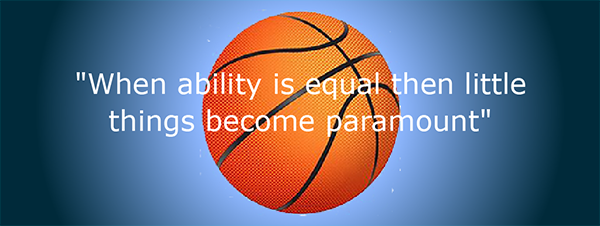
Often over looked but a vital part of basketball is that the game is played with your hands up. You shoot, pass, dribble, receive, rebound, and play defense with the hands up. In fact, the only times a player's hands are down is on a mistake such as a loose ball or when receiving a very low pass. Therefore, it is imperative that players, on every level, of the game create a habit of having their hands up at all times.
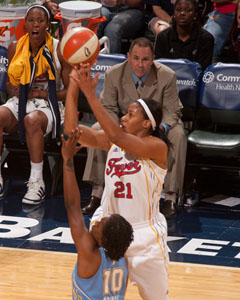
Both Hands Are Up When Shooting
All types of shots, including layups, are shot with the hands up. Since underhand lay ups are very susceptible to being blocked, it is highly recommended that players develop the habit of shooting layups overhand. Even with the two hand underhand free throw, the shooter finishes with both hands up. Note: the off hand plays a very important role in shooting the ball accurately.
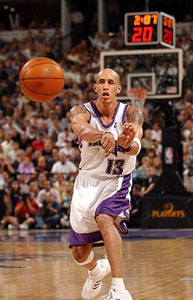
Both Hands Are Up When Passing
Two hand chest pass, finish with thumbs down and palms out position follow through position. When executing a one-handed push pass the off arm is used to protect the ball from the defense. In throwing a baseball pass the off hand guides and protects the pass in the same matter as in shooting the ball. Except for an underhand flip pass, which most of the time is a dangerous and careless pass, all passes are executed with both hands up.
In passing the basketball, players should always pass to receivers that have both hands up and call for the ball. Therefore, to eliminate unforced turnovers, it is a good rule for players not to pass to any player with their hands down no matter how open. On the NBA level, players learn quickly to keep the hands up on offense; otherwise, their noses will be bloodied with sharp, crisp passes from great passers.
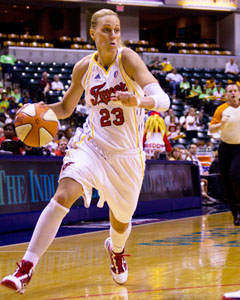
Both Hands Are Up When Dribbling
By rule the dribbling hand must remain on the top of the ball. In fact, it is a violation (carrying or palming the ball) and automatic turnover any time the ball is dribbled with the hand on the side or under the ball. The off hand is held in an elbow high position to protect the ball from the defender.
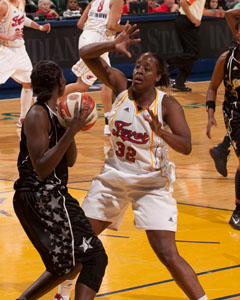
Both Hands Are Up On Defense
When guarding the player with the ball, it is important to have both hands up in order to take away the shot and pass options and forcing the ballhandler out of a triple threat position. When guarding a player without the ball, having hands up allows for deflections and interceptions. It also discourages passers in throwing the ball to the defender's opponent. When playing zone defense having the hands up is mandatory.
Statistically, having both hands up on the shooter has approximately 10% effect on a shooter's shooting percentages. As a result, if your opponent is a great shooter (50%) having hands up makes them a good shooter. A good shooter (45%) becomes an average shooter, and an average shooter (40%) becomes a poor shooter.
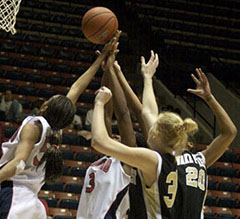
Both Hands Are Up When Rebounding
Both offensive and defensive rebounding positioning requires having both hands up ready to react to the ball. Rebounders must assume every shot is going to be missed. If they watch the flight of the ball with their hands down, they become easy targets to be boxed out. Therefore, improving hand quickness and playing skills in becoming a better basketball player, starts by creating a habit of holding both hands up any time you are on a basketball court.

Basketball is a Game of Habits
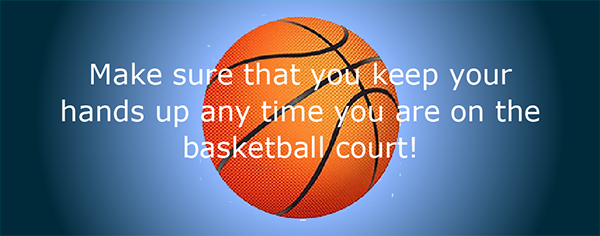
During practices, you should even hold your hands up any time a coach is talking. This accomplishes two things: first and foremost, it is a good way to remind you to pay attention and listen. As a player, before you can learn any basketball skills, you must learn to listen and see. Secondly, in holding your hands up throughout practice, it helps to condition and strengthen all the muscles that are required to keep your hands up.
Once you learn to keep your hands up, it will eliminate many of the unforced turnovers along with increasing your scoring and passing abilities. By having your hands up, it also creates a positive attitude of wanting and calling for the ball which in turn develops and increases your confidence.
Note: When players hold their hands down, it is called the "Push Up" position and indicates that the player wants to do pushups. Coaches should be happy to oblige them in instituting an automatic 10 push up rule for any player not holding their hands up during the course of any practice.
© 2026 HoopTactics All Rights Reserved.
